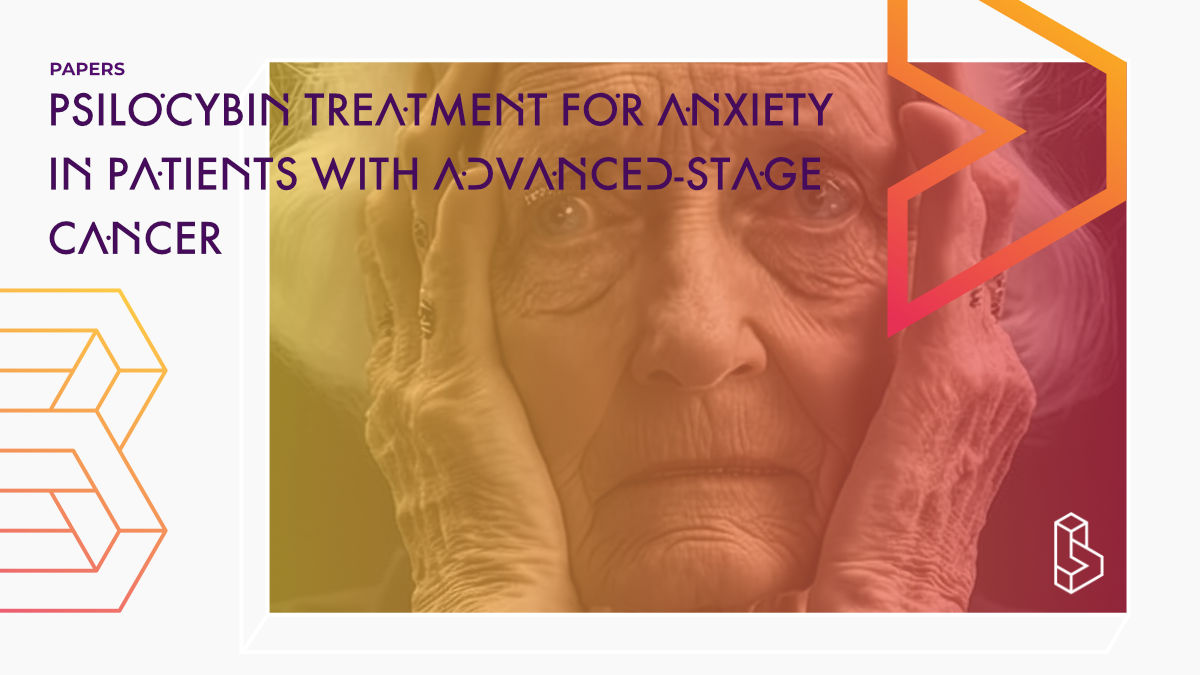This is the first (modern) double-blind placebo-controlled study (n=12) of psilocybin (14mg/70kg) for the treatment of (end-of-life) anxiety (and depression) related to cancer. Treatment led to a significant reduction in anxiety symptoms up to three months after treatment and improvements in depressive symptoms reached significance after six months.
Abstract of Pilot study of psilocybin treatment for anxiety in patients with advanced-stage cancer
“Context: Researchers conducted extensive investigations of hallucinogens in the 1950s and 1960s. By the early 1970s, however, political and cultural pressures forced the cessation of all projects. This investigation reexamines a potentially promising clinical application of hallucinogens in the treatment of anxiety reactive to advanced-stage cancer.
Objective: To explore the safety and efficacy of psilocybin in patients with advanced-stage cancer and reactive anxiety.
Design: A double-blind, placebo-controlled study of patients with advanced-stage cancer and anxiety, with subjects acting as their own control, using a moderate dose (0.2 mg/kg) of psilocybin.
Setting: A clinical research unit within a large public sector academic medical center.
Participants: Twelve adults with advanced-stage cancer and anxiety.
Main outcome measures: In addition to monitoring safety and subjective experience before and during experimental treatment sessions, follow-up data including results from the Beck Depression Inventory, Profile of Mood States, and State-Trait Anxiety Inventory were collected unblinded for 6 months after treatment.
Results: Safe physiological and psychological responses were documented during treatment sessions. There were no clinically significant adverse events with psilocybin. The State-Trait Anxiety Inventory trait anxiety subscale demonstrated a significant reduction in anxiety at 1 and 3 months after treatment. The Beck Depression Inventory revealed an improvement of mood that reached significance at 6 months; the Profile of Mood States identified mood improvement after treatment with psilocybin that approached but did not reach significance.
Conclusions: This study established the feasibility and safety of administering moderate doses of psilocybin to patients with advanced-stage cancer and anxiety. Some of the data revealed a positive trend toward improved mood and anxiety. These results support the need for more research in this long-neglected field.”
Authors: Charles S. Grob, Alicia L. Danforth & Gurpreet S. Chopra
Notes on a pilot study of psilocybin treatment for anxiety in patients with advanced-stage cancer
The dosage of 0.2mg per kg (14mg/70kg) was moderate and lower than that used in other studies.
The study was limited by its size but has served as a stepping stone for much subsequent research. Notably, related to anxiety and depression, Psilocybin produces substantial and sustained decreases in depression and anxiety in patients with life-threatening cancer: A randomized double-blind trial (Griffiths et al., 2016)
This study is included in a meta-analysis by Goldberg et al. (2020) – the effect of psilocybin on anxiety and depression, and another meta-analysis by Vargas et al. (2020) – the effect of psilocybin on anxiety and depression at end-of-life. And it is included in the meta-analytical review by Galvão-Coelho and colleagues (2021) that found psychedelics to improve mood (for those with mood disorders) both in the short and long term (up to 60 days).
Summary of a pilot study of psilocybin treatment for anxiety in patients with advanced-stage cancer
Psilocybin treatment resulted in safe physiological and psychological responses and a significant reduction in anxiety and depression at 1 and 3 months after treatment.
Hallucinogens are being studied in formal psychiatric settings again, and psilocybin is being investigated as a potential treatment. It was found to be active orally at around 10 mg, with stronger effects at higher doses.
Recent clinical examinations of psilocybin have indicated that it is not hazardous to physical health. It has been shown to increase the cerebral metabolic rate of glucose and may be associated with “robust acute reductions” in core obsessive-compulsive disorder symptoms.
During the first wave of hallucinogen research, patients with end-stage cancer reported improved mood and reduced anxiety. The present study explores this potential.
Find this paper
Pilot study of psilocybin treatment for anxiety in patients with advanced-stage cancer
https://doi.org/10.1001/archgenpsychiatry.2010.116
Open Access | Google Scholar | Backup | 🕊
Cite this paper (APA)
Grob, C. S., Danforth, A. L., Chopra, G. S., Hagerty, M., McKay, C. R., Halberstadt, A. L., & Greer, G. R. (2011). Pilot study of psilocybin treatment for anxiety in patients with advanced-stage cancer. Archives of general psychiatry, 68(1), 71-78.
Study details
Compounds studied
Psilocybin
Topics studied
Anxiety
Depression
Palliative Care
Study characteristics
Original
Placebo-Controlled
Active Placebo
Double-Blind
Participants
12
Humans
Authors
Authors associated with this publication with profiles on Blossom
Charles GrobCharles Grob is a Professor of Psychiatry & Biobehavioral Sciences and Pediatrics at UCLA. His work with MDMA was the first FDA approved Phase 1 study. He co-founded the Heffter Research Institute and is also affiliated with the Lundquist Institute for Biomedical Innovation.
Alicia Danforth
Alicia Danforth is a clinical psychologist who specializes in psychotherapy for autistic adults (private practice). Next to this she also works on several clinical studies and provides integration work.
Institutes
Institutes associated with this publication
University of California San DiegoThe Psychedelics and Health Research Initiative (PHRI) at UC San Diego conducts novel basic and clinical research on the use of psychedelics.
Compound Details
The psychedelics given at which dose and how many times
Psilocybin 14 mg | 1xLinked Clinical Trial
Effects of Psilocybin in Advanced-Stage Cancer Patients With AnxietyThis double-blind cross-over trial (n=12) investigates the effects of psilocybin (14mg/70kg) on advanced-stage cancer patients experiencing anxiety.

